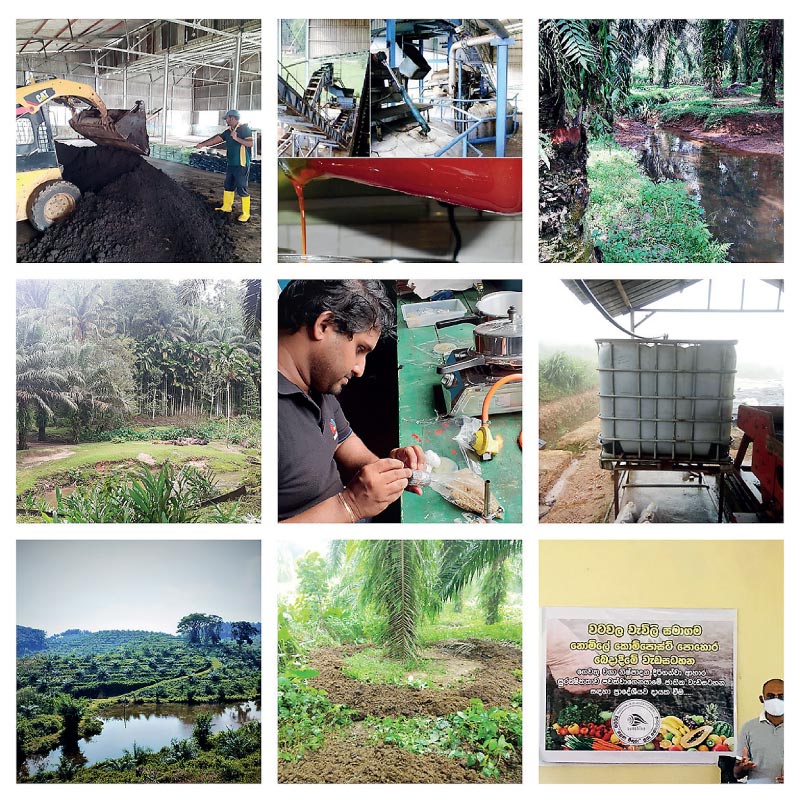Saturday Feb 21, 2026
Saturday Feb 21, 2026
Wednesday, 10 November 2021 00:29 - - {{hitsCtrl.values.hits}}

Snapshots of WPL’s strong sustainable agribusiness initiatives across Sri Lanka
 For decades leading up to the millennium, the global demand for food increased steadily, along with growth in the world’s population, the emergence of new technologies, and the diversification of diets. However, as the land for agriculture grows limited with time, coupled with rapidly advancing climate change, biodiversity loss, and water scarcity, this rising food demand weighs over and above the population's capacity to produce food, posing a significant threat to food security.
For decades leading up to the millennium, the global demand for food increased steadily, along with growth in the world’s population, the emergence of new technologies, and the diversification of diets. However, as the land for agriculture grows limited with time, coupled with rapidly advancing climate change, biodiversity loss, and water scarcity, this rising food demand weighs over and above the population's capacity to produce food, posing a significant threat to food security.
Across the globe, this has called for swift measures to drive sustainable agricultural development measures and boost agricultural productivity. In Sri Lanka, an agricultural mecca known worldwide for its high-quality agro exports, companies, researchers, policymakers, producers and farmers are seen to lead and incite positive, eco-friendly change within this industry. This is by aligning with the nation’s revised policies on sustainability and implementing and innovating within their businesses to refocus and rebuild its agronomic agenda and empower the many lives dependent on this industry.
Steering Sri Lanka's green revolution towards an evergreen revolution
The first step towards sustainable, climate-resilience agriculture is to transform Sri Lanka’s current model based on principles of the green revolution to that of an evergreen one. This is because the increased use of chemicals and irrigation that were key to progress years ago are no longer environmentally sustainable in the current day due to factors such as the pollution of groundwater, loss of biodiversity and soil erosion.
The development of renewable energy sources, improvement of waste segregation and recycling techniques, improvement of water management, development of ecological agriculture and other green enterprises support this evergreen agenda.
For an evergreen revolution to take root within the nation, a smooth transition in operations is vital. For instance, while banning chemicals and artificial fertiliser might be a necessary option, the execution of such an impactful decision should be rolled out through systematic planning.
Adopting sustainable agriculture practices
As a massive agricultural exporter, Sri Lanka needs to focus its resources on sustainable practices that do not dry out fertile soil and debilitate its economy. Producers need to focus on the increased input of organic manure such as compost and animal dung, crop rotation with seasons, nitrogen fixation by adding legumes, agroforestry with trees interspersed with crops, and collecting local varieties of a crop and growing them.
It is also important to prioritise crop selection and be active in protecting and conserving landraces and wild varieties of crops while making sure to use integrated farming systems. The conservation and multiplication of natural predators, parasites, parasitoids and microbes in the field, and the introduction of science and technologies in agricultural sectors, particularly remote control (remote sensing, GIS Mapping), are several other methods currently being adopted into practice.
Using chemical fertilisers to power enhanced crop productions inevitably damages both environmental ecology and human health with great severity. Employing microbes as bio-fertilisers is considered a viable, safer alternative to chemical fertilisers in the agricultural sector.
Further, it should be noted that multi-crops and diversification ensure sustainability compared to monoculture, where pest management and ecological equilibrium disrupt the flow of sustainable agriculture.
Mixed animal and cropping systems contain the capacity to create closed cycles of nutrients which improve the productivity of both the animal and the cropping systems. Returning to this original system will heal the land resource that has deteriorated from the industrialised mono-cultural system. As a company championing the country’s sustainability plan, Watawala Plantations PLC (WPL) is currently synergising Watawala Dairy Farm and Watawala Plantations by resource recycling to move towards this end.
Pro-ecological development driven by a green economy
A green economy further encourages and facilitates progress towards the three pillars of sustainable development; people, planet and profit, which is low carbon, resource-efficient and socially inclusive. Within Sri Lanka, pro-ecological development is also determined by state support and specific environmental policy.
One obstacle that disrupts conversion into pro-ecological development is the increased price of raw materials, pre-fabricated, and ecological products. As an industry, we must be committed to curbing this issue as this country-wide conversion largely depends on the population’s motivation to move forward with such products.
Promoting ecological products require value addition. This incorporates them into other 'secondary' products that have higher net worth so that each unit of the product can be sold at a higher price to earn a higher return.
It is important to market these products to sell; not just a product but an ideology that encourages consumers to contribute towards a more resilient environment. This results in high consumption, which will inevitably lead to higher production and reduced manufacturing costs.
In Sri Lanka, another methodology to promote pro-ecological development is to maintain compliance with certifications and standards such as the Roundtable of Sustainable Palm Oil and carbon footprint certifications, which encourage sustainable change. These standards mandate conducting biological assessments, land-use change analyses before land conversions for agriculture, feasibility analyses, environmental impact assessments, and high conservation value assessments.
Empowering Sri Lanka's farming sector to convert to sustainable agriculture
As the first point of change, the accelerating costs and escalating bi-annual associate wage hikes need to be addressed prudently. Companies should be prepared for the change in wage hikes subject to productivity improvement in the current economic landscape. Social business models, mechanisation and diversification, are important in this context.
Watawala Plantations operates a social business model in maintaining grasslands for Watawala Dairy and some lands dedicated to tea cultivation. The organisation’s mechanism is adopted through shear harvesting, pruning in fields and high technology implementation in the Watawala Dairy Farm. At the same time, Watawala Plantations has also diversified into avenues such as fuelwood, mixed crops, cash crops and dairy FMCG. Further, companies should prioritise the introduction of novel technology to farmers to ensure better productivity, quality product and low cost.
Finally, on an individual level, all Sri Lankans should be encouraged to choose locally grown, organic products, start their gardens, support green education and community gardens, purchase from local markets and learn more about how food is grown. Through the collective effort of all, we can create a sustainable Sri Lanka, in which all stakeholders of sustainable agriculture can thrive and contribute towards a more resilient nation.
[The writer is the Chief Executive Officer of Watawala Plantations PLC.]